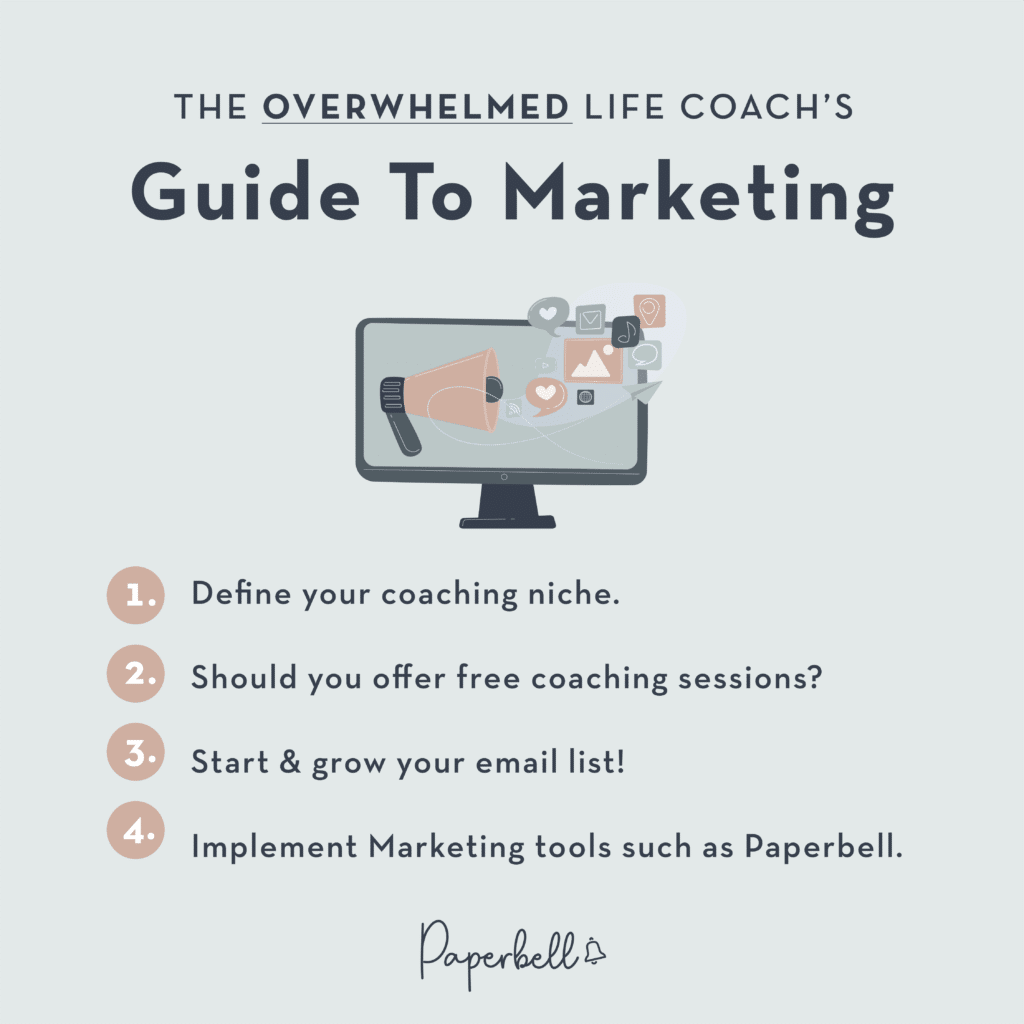Email marketing, networking, Instagram reels, TikTok, live videos, the list goes on and on…
Marketing for life coaches can be overwhelming, which leads to not taking action. The result? No marketing = No revenue.
Marketing is essential for any business, especially if you want to build one in life coaching. So, let’s dig into how you can market your life coaching practice and find your ideal clients.
First, Define Your Coaching Niche

Before you market your online coaching business, it’s critical that you define your niche. Narrowing down your audience will clearly define your area of expertise, and it will determine who you serve.
Without being clear on these two pieces of the puzzle, you’ll struggle to attract your ideal clients. Here are some examples of defined niches:
- A Relationship Coach who helps women get back into the dating scene after divorce.
- A Doula (Birth Coach) who provides support to first-time moms.
- An ADHD Coach who helps entrepreneurs be more productive in their businesses.
You get the point.
When you have a clear niche, the marketing becomes less overwhelming.
Talk to Your Target Clients
Once you decide the segment of society you want to target with your offering, you need to get out there and talk to those target clients so you can fully understand their needs.
When you understand the pain points and needs of your ideal clients, you can speak directly to the right people with your messaging and methods.
You can do this by conducting customer interviews with people who fit your target audience. Ask them open-ended questions about why they would hire a life coach and how they would choose one. Ask questions that give you more unbiased answers and more accurate insights.
To find target clients, think about where they hang out: Are they on a particular social media platform? Do they chat on topical forums or attend niche real-life events?
Learn about your audience before you write your marketing plan to understand which tactics you should leverage to reach them. This will allow you to make informed decisions about how to get in front of your prospective clients.
Should You Offer Free Coaching Sessions?
You might have toyed with the idea of offering some free sessions to get new clients. While there’s no right or wrong answer to this question, here are a couple of suggestions that might help you.
If you want to offer free coaching calls, consider limiting this to a few clients. For example, you could offer a few one-time free sessions in exchange for testimonials. If the clients are delighted at the end of this session, they may decide to work with you long-term. At the very least, you’ll have a few testimonials to use as social proof of your work.
If you already have testimonials, consider offering value through free coaching tools and content. This content can be delivered through regular live or pre-recorded videos, podcast episodes, blog articles, or social media posts (more on this later).
The #1 Life Coach Marketing Tool: Your Email List
Starting and growing an email list is crucial to attracting your ideal clients. It’s an asset that belongs to you; not Facebook, Instagram, TikTok, or another platform.
Building a list of email addresses is valuable because no matter how algorithms change, you’ll still be able to connect with your audience.
Still not convinced? Here’s an interesting stat: According to one study, email generates $38 for every $1 spent, which is a whopping 3,800% return on investment.
So, how do you start a list? The idea is to offer something for free in exchange for your subscriber’s name and email address.
It can be as simple as an invitation to join your newsletter for subscriber-only content, for example: “Join my newsletter to get my best tips on launching an online course that I only send to my subscribers.”
Or, if you want to kick it up a notch, offer them something of specific value, otherwise known as a lead magnet. It can come in various forms, such as a PDF, video series, challenge, quiz, or ebook. I suggest starting with a downloadable PDF as it’s the easiest way to create a lead magnet and set up your list.
Not sure what to include in the PDF? Here are a few examples from business coaches using this strategy:
- Facebook Ads Checklist: 7 Essential Steps to Facebook Ads That Convert
- Five Simple Steps to Create the Ultimate Free Offer
- From Dream to Launch: 10 Steps + Must-Have Tools to Launch Your Online Business
The bottom line is you want to create something that will give your prospective clients a taste of your expertise. Think of your lead magnet as the appetizer before the meal (your paid offer). If they love your content, your coaching package will be much easier to sell.
How to Set up Your Email List
Next, you’ll need to set up the tools that will capture your subscriber’s name and email address and deliver the lead magnet. This can be done by creating a simple landing page linked to your email system.
You can also use Paperbell to build your email list. Let’s say you want to build a list of potential 1:1 coaching clients. If you start with a free discovery call, you can set up a free package with a landing page and your availability.
Then, you can use Zapier to connect Paperbell with your email service provider. This will allow subscribers to enter their information in Paperbell, send the data to your email service provider, and deliver the lead magnet.
After you set this up, you’ll get a link to your offer so you can start sharing your lead magnet online.
Here are some examples of where you can promote your lead magnet:
- Your life coaching website homepage header
- Your website entry and exit pop-ups
- Your blog post sidebars
- Your email signature
Doing this will give your target audience several opportunities to sign up for your freebie.
3 Strategies to Leverage Other People’s Audiences
Next, let’s talk about some specific ideas for growing your coaching business. One of the most effective ways to do this is by using organic strategies first. This will help you validate if you’ve created the right offer for your audience.
This is important because if you invest money in paid ads with the wrong offer, you’ll waste your resources. Organic marketing will pay off in the long run and help you save money on paid advertising.

Here are some great ways to organically market your Life Coaching business:
Podcast Interviews
Podcasts have exploded in popularity and doubled their listeners in recent years. So, now is a great time to pitch yourself to be a guest on one.
There are podcasts for every coaching niche, including:
- Business
- Relationships
- Health
- Fitness
- Finances
- Marketing
- Yoga
- Mindset
One of the biggest advantages of being a podcast guest is the host doing the marketing for the episode. This is the perfect opportunity to tell listeners about your lead magnet, build your email list, and promote your coaching programs.
Your host already has a targeted audience, so you will be able to attract high-quality leads.
Virtual Summits
Got a knack for speaking on virtual stages? If so, giving a talk at a Virtual Summit can be a great strategy for you.
Similar to podcasts, there are virtual summits in a variety of industries. There are also a number of opportunities that can come from speaking at one, such as new connections and getting your name and expertise out there.
To make the most of virtual summits, you can create a QR code for your lead magnet and display it at the end of your presentation. This way, audience members who were inspired by you will be able to connect with you after the event.
Another benefit of virtual summits is that you’ll likely connect with the host and other speakers. These events usually have closed channels where all the speakers can connect and get support throughout the event. Use this opportunity to partner with other experts who are serving your audience in a different way.
For example, if you’re a Marriage Coach, you may partner with a Sex Coach for couples. This could lead to other speaking opportunities or regular client referrals.
Finally, being featured as a speaker at an event with big names in your industry will help you establish credibility. This will position you as a trustworthy authority, leading to more clients.
Guest Blog Posts
Have a knack for writing? Don’t discount your passion for putting pen to paper (or fingers to keyboard). Guest blogging is a great way to market your coaching business. Did you know that 60-77% of internet users read blogs, and there are 600 million blogs online today?
There are countless bloggers looking for writers to contribute to their content. For instance, if you’re a fitness coach, you could write a guest article for a blog on women’s health.
Or, if you’re a parenting coach, there are mom blogs looking for experts to share their knowledge on parenting tips, like how to boost your child’s self-esteem, teaching social skills, and effective discipline.
Established blogs tend to have a high volume of traffic, which means more exposure for you in Google searches related to your niche. Best of all, in most cases, you can link back to your website where readers can sign up for your lead magnet or inquire about your coaching programs. So don’t skip guest blogging as a potential strategy for your marketing.
3 Networking Strategies for Life Coaches
Let’s look at some simple ways you can use networking to attract clients both online and in the real world.
Facebook Groups
Social media communities are perfect for finding people interested in your life coaching business.
Similar to podcasts and virtual summits, there’s a Facebook group for every niche. As you engage with group members, you’ll likely find yourself getting to know other coaches and potential clients.
One of the things that can come out of this type of virtual networking is collaboration. For example, if you’re a business coach, you may partner with a marketing coach to create a special offer for your clients. Or simply refer clients to one another.
Plus, obviously, you can connect directly with potential clients. Just be sure to honor the particular community guidelines of the Facebook group.
Events
Networking events are a great addition to your marketing strategy as well. Connect with people attending the same breakout sessions or networking parties as you. Many events now offer streamlined ticket booking options, making it easier to plan ahead and focus on building connections.
You can also do this virtually. At online events, you may have the opportunity to break out into a “Zoom room” for speed networking sessions with other attendees.
Whether virtual or in-person, events create a variety of possibilities to share what you do and who you serve. Building a professional network is a surefire way to develop relationships and attract new clients consistently.
Coworking Spaces
More and more people are catching on to the concept of coworking. It’s an arrangement where different businesses share the same office space, a modern take on using commercial real estate at a fraction of the cost.
In recent years, more and more coaches are taking advantage of coworking. Not only is it an opportunity to meet local clients, but also to host small events and network with other business owners.
Many coworking spaces host events for entrepreneurs and service providers to network and get to know each other. This creates opportunities to form collaborations or book clients.
It’s also a great way to make social connections; being a life coach can be lonely if you work from home. You can use local coworking spaces not just as a part of your advertising but to make friends too.
4 Tips to Use Social Media Marketing as a Life Coach
From Facebook and Instagram to TikTok and Pinterest, you can use several social media platforms as a coach.
While it may be tempting to jump on every single one, consider starting with one platform and moving on to the next once you get the hang of it.
1. Choose the Right Social Media Platform
Ask yourself this question: Where is my audience hanging out?
Say, you serve stay-at-home mothers. One platform you may want to consider is Pinterest, which 80% of moms use.
If your business serves millennials, you may want to get on Instagram instead, as 62.3% of their users are age 34 or younger.
2. Play to Your Strengths
Marketing is all about playing to your strengths. So once you know where your audience hangs out, think about the best way to create value for them.
If you crush it on video, then choose a platform that specializes in video content. Are you an excellent writer? Then you may start with a platform where you can write long-form posts.
3. Serve, Then Sell
When creating content, add value with helpful tips, resources, and inspirational stories that speak to your audience’s pain points and goals. This will help you avoid overselling to your audience (which can be a turn-off).
The 80/20 rule is a good place to start: 80% of your content should be helpful, and the remaining 20% will be an offer of some sort. In this 20%, you can offer a lead magnet, a free discovery call, or even a paid offer.
Your aim should be to serve high-quality content that your prospects find useful. This will help you build trust and rapport with them so you’ll be top-of-mind in your niche when they need your expertise.
4. Stay Consistent
No matter which platform you’re on, the most important thing is staying consistent. Without showing up regularly to your audience, you’ll get lost in the noise.
So how do you do this without getting overwhelmed? Develop a system to create and post your content. For example, block off time in your calendar when you only focus on creating content for the week or month ahead, scheduling it, and engaging with your audience.
The key to winning on social media is to keep showing up. Find ways to offer value and answer client questions and comments to engage with your audience.
How Life Coaches Can Leverage AI for Marketing
AI can simplify your marketing and help you stay consistent. From writing social media posts to automating email campaigns, it can reduce the time you spend on manual tasks.
AI-powered insights can also personalize content based on your audience’s behavior, increasing engagement. AI chatbots can help you respond to inquiries or book appointments 24/7, ensuring your coaching practice remains accessible even when you’re offline.
Here are a few ways AI can help your marketing:
- Social media automation: Use Buffer or Hootsuite to schedule posts across multiple platforms, manage content calendars, and track performance analytics.
- Email personalization: ActiveCampaign offers AI-driven email personalization, allowing you to send tailored messages based on user behavior and preferences.
- AI chatbots: ManyChat is a great tool to create AI-powered chatbots that can engage with clients, answer FAQs, and schedule appointments 24/7.
- Content creation: Copy.ai is ideal for generating marketing ideas, social media posts, or blog drafts quickly, saving time on creative tasks.
- Analytics: AI marketing analytics software such as Whatagraph can help you track and monitor all your relevant metrics in one place.
It’s Time for Implementation
While you immerse yourself in the marketing of your coaching business, remember to give yourself some grace.
There may be times when you feel it’s not working. When this happens, don’t beat yourself up or throw in the towel. Take a short break, ask for advice, and then get back on track. Pushing yourself too hard won’t lead to better results.
If you’re afraid of putting yourself out there, it’s always helpful to shift your focus to the impact you will have on your clients. Marketing for life coaches isn’t always linear, and it may take some experimentation.
Hopefully, this post has given you some inspiration to get started. And if you’re looking to uplevel your coaching business, check out Paperbell.
It’s an all-in-one client management system that will boost your marketing efforts and take bookings, payments, contracts, and other admin tasks off your hands. Try it for free with your first client.

Editor’s Note: This post was originally published in April 2023 and has since been updated for accuracy.








